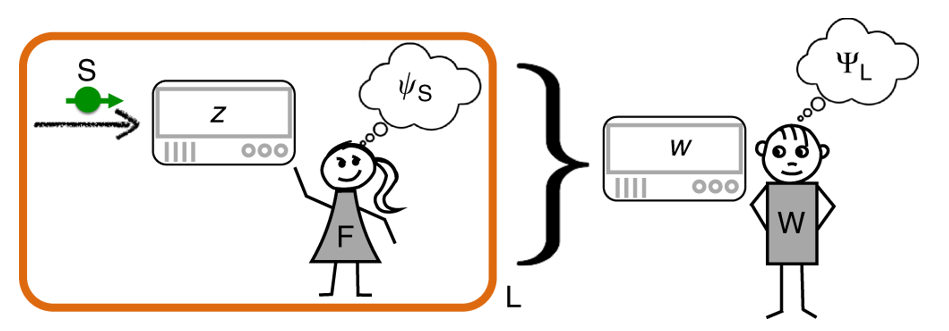Science
Related: About this forumMore Than One Reality Exists (in Quantum Physics)
Source: Live Science
More Than One Reality Exists (in Quantum Physics)
By Mindy Weisberger, Senior Writer | March 20, 2019 07:00am ET
Can two versions of reality exist at the same time? Physicists say they can — at the quantum level, that is.
Researchers recently conducted experiments to answer a decades-old theoretical physics question about dueling realities. This tricky thought experiment proposed that two individuals observing the same photon could arrive at different conclusions about that photon's state — and yet both of their observations would be correct.
For the first time, scientists have replicated conditions described in the thought experiment. Their results, published Feb. 13 in the preprint journal arXiv, confirmed that even when observers described different states in the same photon, the two conflicting realities could both be true.
"You can verify both of them," study co-author Martin Ringbauer, a postdoctoral researcher with the Department of Experimental Physics at the University of Innsbrück in Austria, told Live Science.
Wigner's friend
This perplexing idea was the brainchild of Eugene Wigner, winner of the Nobel Prize for Physics in 1963. In 1961, Wigner had introduced a thought experiment that became known as "Wigner's friend." It begins with a photon — a particle of light. When an observer in an isolated laboratory measures the photon, they find that the particle's polarization — the axis on which it spins — is either vertical or horizontal.
-snip-
Read more: https://www.livescience.com/65029-dueling-reality-photons.html
______________________________________________________________________
Related: Experimental rejection of observer-independence in the quantum world (arXiv)
qazplm135
(7,447 posts)where Trump and Pence are abducted by aliens and Pelosi becomes President?
caraher
(6,278 posts)from MIT's Technology Review
Cool stuff... though my read on this is that the same moves one can make to respond to Bell inequality violations (e.g. giving up locality, which is popular among physicists I know) can suffice to explain this kind of result as well.
Jim__
(14,076 posts)The article from Daily Nous contains 5 short essays discussing this experiment by: Karen Crowther, Sean Carroll (Carroll is a physicist, not a philosopher), Dustin Lazarovici, Tim Maudlin, and Wayne Myrvold.
A short excerpt from Crowther's essay:

Figure 1. Wigner’s thought-experiment.
Wigner’s friend, F, measures the polarisation S of a photon, obtaining outcome z, which is a definite state, so F records one of two definite states for ?S.. Wigner, W, who is outside the lab instead regards the lab as one big quantum system, L (orange box). Wigner argued that, having no access to z, he would assign a superposition state ?L to the system (i.e., ?L is not the same as ?S — one is a definite state, the other a superposition). Deutsch (1985) argued that Wigner could even perform a carefully designed measurement to test this state-assignment, w. Figure and description from Frauchiger & Renner (2018).
_____________________________________________________________________________________
...
Wigner’s own interpretation was that the scenario described by his thought-experiment was physically impossible: he argued that the conscious experience of his friend as having recorded a definite measurement-outcome would mean that after her measurement, it would not be correct for Wigner on the outside of the lab to describe the system as being in a superposition. This interpretation means believing that a “being with a consciousness must have a different role in quantum mechanics than the inanimate measuring device”, and hence that there must be “a violation of physical laws where consciousness plays a role” (Wigner, 1967, p. 181).
...
In this ‘real life’ experiment, however, Wigner and his friend are not conscious observers, but pieces of machinery: they are measuring-and-recording devices. Proietti et al. (2019) argue that these devices can act as observers, defining an observer as any physical system that can extract information about another system (by means of an interaction) and can store that information in a physical memory. On this definition, computers and other devices can act as observers, just as humans can.
Now, what the experiment actually did was to use QM to calculate the probabilities of each of the possible measurement outcomes, and then compare these to the probabilities calculated from the experimental data obtained (1794 six-photon coincidence events, using 64 settings, over a total of 360 hours). The experimenters did this in order to test the violation of a Bell-type inequality, and the experiment was indeed successful in confirming its violation. Thus, the significance of the experiment in this sense was to further confirm the violation of Bell-type inequalities by quantum systems (even relatively large, complex ones) and to place stricter constraints on particular hidden variable interpretations of QM. But there are already many other experiments that have confirmed the violation of Bell-type inequalities by quantum systems (although under different conditions, and subject to different ‘loopholes’ and sources of error). And, there are already many other experiments that have confirmed that QM is not restricted in its domain to very small systems.
...
FiveGoodMen
(20,018 posts)then none of the discussions (here or elsewhere) can ever produce meaningful results and no plans can ever be expected to work.